Qiushi Sun
OdysseyArena: Benchmarking Large Language Models For Long-Horizon, Active and Inductive Interactions
Feb 05, 2026Abstract:The rapid advancement of Large Language Models (LLMs) has catalyzed the development of autonomous agents capable of navigating complex environments. However, existing evaluations primarily adopt a deductive paradigm, where agents execute tasks based on explicitly provided rules and static goals, often within limited planning horizons. Crucially, this neglects the inductive necessity for agents to discover latent transition laws from experience autonomously, which is the cornerstone for enabling agentic foresight and sustaining strategic coherence. To bridge this gap, we introduce OdysseyArena, which re-centers agent evaluation on long-horizon, active, and inductive interactions. We formalize and instantiate four primitives, translating abstract transition dynamics into concrete interactive environments. Building upon this, we establish OdysseyArena-Lite for standardized benchmarking, providing a set of 120 tasks to measure an agent's inductive efficiency and long-horizon discovery. Pushing further, we introduce OdysseyArena-Challenge to stress-test agent stability across extreme interaction horizons (e.g., > 200 steps). Extensive experiments on 15+ leading LLMs reveal that even frontier models exhibit a deficiency in inductive scenarios, identifying a critical bottleneck in the pursuit of autonomous discovery in complex environments. Our code and data are available at https://github.com/xufangzhi/Odyssey-Arena
TIDE: Trajectory-based Diagnostic Evaluation of Test-Time Improvement in LLM Agents
Feb 03, 2026Abstract:Recent advances in autonomous LLM agents demonstrate their ability to improve performance through iterative interaction with the environment. We define this paradigm as Test-Time Improvement (TTI). However, the mechanisms under how and why TTI succeed or fail remain poorly understood, and existing evaluation metrics fail to capture their task optimization efficiency, behavior adaptation after erroneous actions, and the specific utility of working memory for task completion. To address these gaps, we propose Test-time Improvement Diagnostic Evaluation (TIDE), an agent-agnostic and environment-agnostic framework that decomposes TTI into three comprehensive and interconnected dimensions. The framework measures (1) the overall temporal dynamics of task completion and (2) identifies whether performance is primarily constrained by recursive looping behaviors or (3) by burdensome accumulated memory. Through extensive experiments across diverse agents and environments, TIDE highlights that improving agent performance requires more than scaling internal reasoning, calling for explicitly optimizing the interaction dynamics between the agent and the environment.
OS-Symphony: A Holistic Framework for Robust and Generalist Computer-Using Agent
Jan 12, 2026Abstract:While Vision-Language Models (VLMs) have significantly advanced Computer-Using Agents (CUAs), current frameworks struggle with robustness in long-horizon workflows and generalization in novel domains. These limitations stem from a lack of granular control over historical visual context curation and the absence of visual-aware tutorial retrieval. To bridge these gaps, we introduce OS-Symphony, a holistic framework that comprises an Orchestrator coordinating two key innovations for robust automation: (1) a Reflection-Memory Agent that utilizes milestone-driven long-term memory to enable trajectory-level self-correction, effectively mitigating visual context loss in long-horizon tasks; (2) Versatile Tool Agents featuring a Multimodal Searcher that adopts a SeeAct paradigm to navigate a browser-based sandbox to synthesize live, visually aligned tutorials, thereby resolving fidelity issues in unseen scenarios. Experimental results demonstrate that OS-Symphony delivers substantial performance gains across varying model scales, establishing new state-of-the-art results on three online benchmarks, notably achieving 65.84% on OSWorld.
OS-Oracle: A Comprehensive Framework for Cross-Platform GUI Critic Models
Dec 18, 2025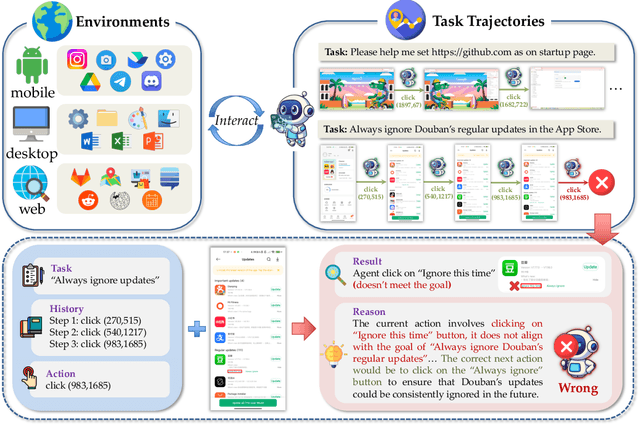
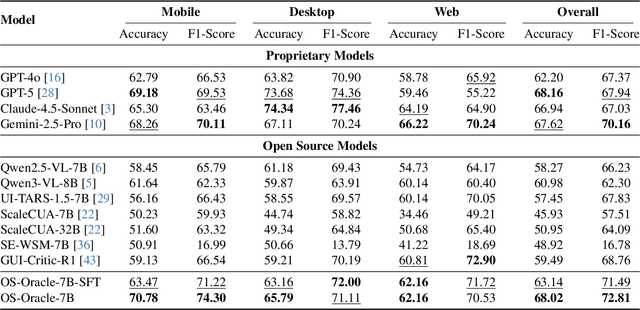
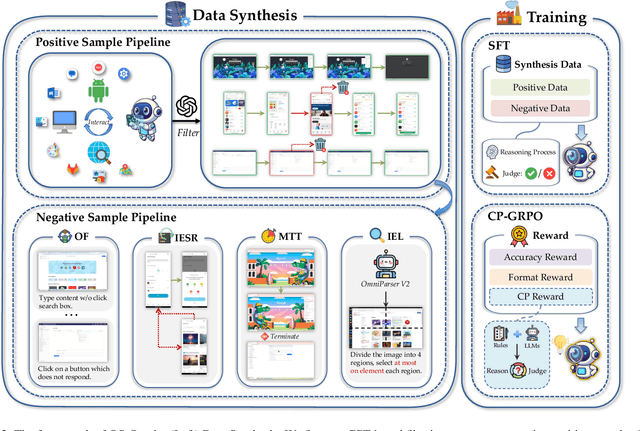

Abstract:With VLM-powered computer-using agents (CUAs) becoming increasingly capable at graphical user interface (GUI) navigation and manipulation, reliable step-level decision-making has emerged as a key bottleneck for real-world deployment. In long-horizon workflows, errors accumulate quickly and irreversible actions can cause unintended consequences, motivating critic models that assess each action before execution. While critic models offer a promising solution, their effectiveness is hindered by the lack of diverse, high-quality GUI feedback data and public critic benchmarks for step-level evaluation in computer use. To bridge these gaps, we introduce OS-Oracle that makes three core contributions: (1) a scalable data pipeline for synthesizing cross-platform GUI critic data; (2) a two-stage training paradigm combining supervised fine-tuning (SFT) and consistency-preserving group relative policy optimization (CP-GRPO); (3) OS-Critic Bench, a holistic benchmark for evaluating critic model performance across Mobile, Web, and Desktop platforms. Leveraging this framework, we curate a high-quality dataset containing 310k critic samples. The resulting critic model, OS-Oracle-7B, achieves state-of-the-art performance among open-source VLMs on OS-Critic Bench, and surpasses proprietary models on the mobile domain. Furthermore, when serving as a pre-critic, OS-Oracle-7B improves the performance of native GUI agents such as UI-TARS-1.5-7B in OSWorld and AndroidWorld environments. The code is open-sourced at https://github.com/numbmelon/OS-Oracle.
ScaleCUA: Scaling Open-Source Computer Use Agents with Cross-Platform Data
Sep 18, 2025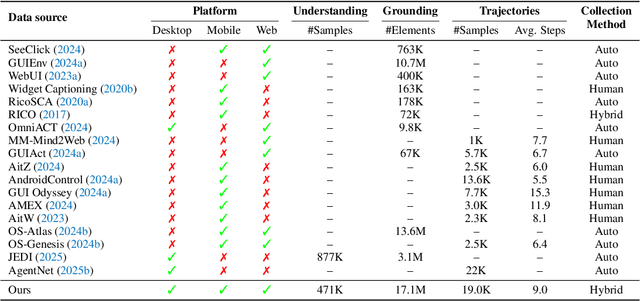
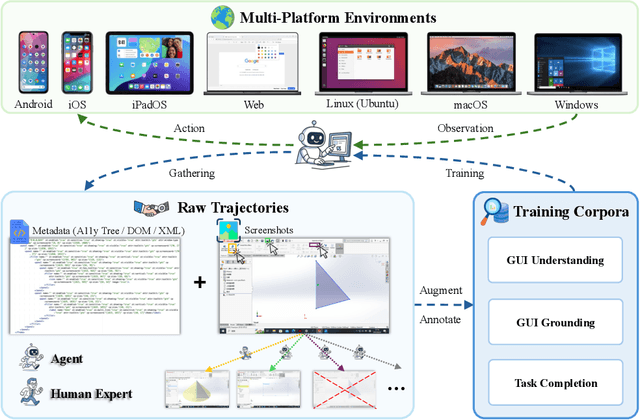
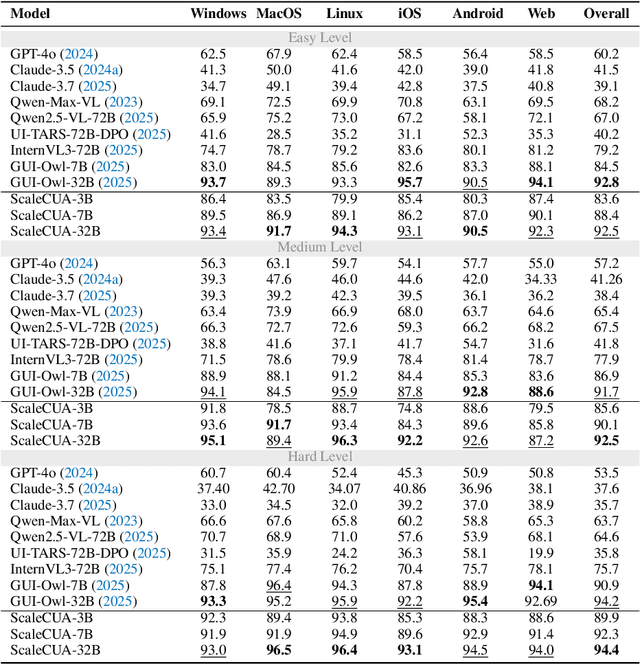
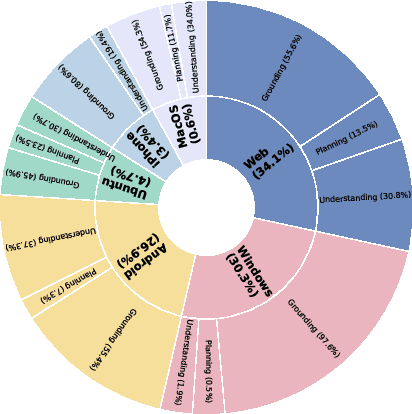
Abstract:Vision-Language Models (VLMs) have enabled computer use agents (CUAs) that operate GUIs autonomously, showing great potential, yet progress is limited by the lack of large-scale, open-source computer use data and foundation models. In this work, we introduce ScaleCUA, a step toward scaling open-source CUAs. It offers a large-scale dataset spanning 6 operating systems and 3 task domains, built via a closed-loop pipeline uniting automated agents with human experts. Trained on this scaled-up data, ScaleCUA can operate seamlessly across platforms. Specifically, it delivers strong gains over baselines (+26.6 on WebArena-Lite-v2, +10.7 on ScreenSpot-Pro) and sets new state-of-the-art results (94.4% on MMBench-GUI L1-Hard, 60.6% on OSWorld-G, 47.4% on WebArena-Lite-v2). These findings underscore the power of data-driven scaling for general-purpose computer use agents. We will release data, models, and code to advance future research: https://github.com/OpenGVLab/ScaleCUA.
CODA: Coordinating the Cerebrum and Cerebellum for a Dual-Brain Computer Use Agent with Decoupled Reinforcement Learning
Aug 27, 2025Abstract:Autonomous agents for Graphical User Interfaces (GUIs) face significant challenges in specialized domains such as scientific computing, where both long-horizon planning and precise execution are required. Existing approaches suffer from a trade-off: generalist agents excel at planning but perform poorly in execution, while specialized agents demonstrate the opposite weakness. Recent compositional frameworks attempt to bridge this gap by combining a planner and an actor, but they are typically static and non-trainable, which prevents adaptation from experience. This is a critical limitation given the scarcity of high-quality data in scientific domains. To address these limitations, we introduce CODA, a novel and trainable compositional framework that integrates a generalist planner (Cerebrum) with a specialist executor (Cerebellum), trained via a dedicated two-stage pipeline. In the first stage, Specialization, we apply a decoupled GRPO approach to train an expert planner for each scientific application individually, bootstrapping from a small set of task trajectories. In the second stage, Generalization, we aggregate all successful trajectories from the specialized experts to build a consolidated dataset, which is then used for supervised fine-tuning of the final planner. This equips CODA with both robust execution and cross-domain generalization. Evaluated on four challenging applications from the ScienceBoard benchmark, CODA significantly outperforms baselines and establishes a new state of the art among open-source models.
Dynamic and Generalizable Process Reward Modeling
Jul 23, 2025Abstract:Process Reward Models (PRMs) are crucial for guiding Large Language Models (LLMs) in complex scenarios by providing dense reward signals. However, existing PRMs primarily rely on heuristic approaches, which struggle with cross-domain generalization. While LLM-as-judge has been proposed to provide generalized rewards, current research has focused mainly on feedback results, overlooking the meaningful guidance embedded within the text. Additionally, static and coarse-grained evaluation criteria struggle to adapt to complex process supervision. To tackle these challenges, we propose Dynamic and Generalizable Process Reward Modeling (DG-PRM), which features a reward tree to capture and store fine-grained, multi-dimensional reward criteria. DG-PRM dynamically selects reward signals for step-wise reward scoring. To handle multifaceted reward signals, we pioneeringly adopt Pareto dominance estimation to identify discriminative positive and negative pairs. Experimental results show that DG-PRM achieves stunning performance on prevailing benchmarks, significantly boosting model performance across tasks with dense rewards. Further analysis reveals that DG-PRM adapts well to out-of-distribution scenarios, demonstrating exceptional generalizability.
ScienceBoard: Evaluating Multimodal Autonomous Agents in Realistic Scientific Workflows
May 26, 2025



Abstract:Large Language Models (LLMs) have extended their impact beyond Natural Language Processing, substantially fostering the development of interdisciplinary research. Recently, various LLM-based agents have been developed to assist scientific discovery progress across multiple aspects and domains. Among these, computer-using agents, capable of interacting with operating systems as humans do, are paving the way to automated scientific problem-solving and addressing routines in researchers' workflows. Recognizing the transformative potential of these agents, we introduce ScienceBoard, which encompasses two complementary contributions: (i) a realistic, multi-domain environment featuring dynamic and visually rich scientific workflows with integrated professional software, where agents can autonomously interact via different interfaces to accelerate complex research tasks and experiments; and (ii) a challenging benchmark of 169 high-quality, rigorously validated real-world tasks curated by humans, spanning scientific-discovery workflows in domains such as biochemistry, astronomy, and geoinformatics. Extensive evaluations of agents with state-of-the-art backbones (e.g., GPT-4o, Claude 3.7, UI-TARS) show that, despite some promising results, they still fall short of reliably assisting scientists in complex workflows, achieving only a 15% overall success rate. In-depth analysis further provides valuable insights for addressing current agent limitations and more effective design principles, paving the way to build more capable agents for scientific discovery. Our code, environment, and benchmark are at https://qiushisun.github.io/ScienceBoard-Home/.
Breaking the Data Barrier -- Building GUI Agents Through Task Generalization
Apr 15, 2025Abstract:Graphical User Interface (GUI) agents offer cross-platform solutions for automating complex digital tasks, with significant potential to transform productivity workflows. However, their performance is often constrained by the scarcity of high-quality trajectory data. To address this limitation, we propose training Vision Language Models (VLMs) on data-rich, reasoning-intensive tasks during a dedicated mid-training stage, and then examine how incorporating these tasks facilitates generalization to GUI planning scenarios. Specifically, we explore a range of tasks with readily available instruction-tuning data, including GUI perception, multimodal reasoning, and textual reasoning. Through extensive experiments across 11 mid-training tasks, we demonstrate that: (1) Task generalization proves highly effective, yielding substantial improvements across most settings. For instance, multimodal mathematical reasoning enhances performance on AndroidWorld by an absolute 6.3%. Remarkably, text-only mathematical data significantly boosts GUI web agent performance, achieving a 5.6% improvement on WebArena and 5.4% improvement on AndroidWorld, underscoring notable cross-modal generalization from text-based to visual domains; (2) Contrary to prior assumptions, GUI perception data - previously considered closely aligned with GUI agent tasks and widely utilized for training - has a comparatively limited impact on final performance; (3) Building on these insights, we identify the most effective mid-training tasks and curate optimized mixture datasets, resulting in absolute performance gains of 8.0% on WebArena and 12.2% on AndroidWorld. Our work provides valuable insights into cross-domain knowledge transfer for GUI agents and offers a practical approach to addressing data scarcity challenges in this emerging field. The code, data and models will be available at https://github.com/hkust-nlp/GUIMid.
Genius: A Generalizable and Purely Unsupervised Self-Training Framework For Advanced Reasoning
Apr 11, 2025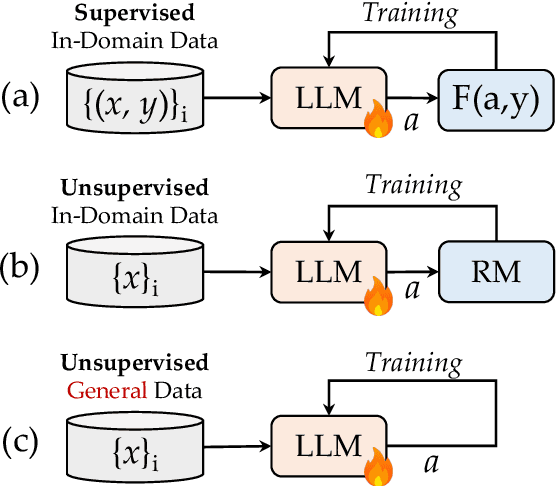
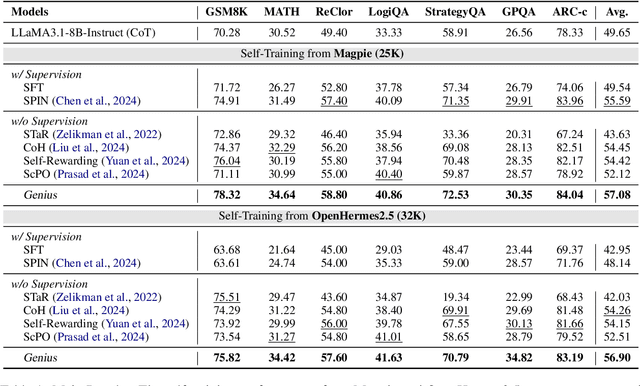


Abstract:Advancing LLM reasoning skills has captivated wide interest. However, current post-training techniques rely heavily on supervisory signals, such as outcome supervision or auxiliary reward models, which face the problem of scalability and high annotation costs. This motivates us to enhance LLM reasoning without the need for external supervision. We introduce a generalizable and purely unsupervised self-training framework, named Genius. Without external auxiliary, Genius requires to seek the optimal response sequence in a stepwise manner and optimize the LLM. To explore the potential steps and exploit the optimal ones, Genius introduces a stepwise foresight re-sampling strategy to sample and estimate the step value by simulating future outcomes. Further, we recognize that the unsupervised setting inevitably induces the intrinsic noise and uncertainty. To provide a robust optimization, we propose an advantage-calibrated optimization (ACO) loss function to mitigate estimation inconsistencies. Combining these techniques together, Genius provides an advanced initial step towards self-improve LLM reasoning with general queries and without supervision, revolutionizing reasoning scaling laws given the vast availability of general queries. The code will be released at https://github.com/xufangzhi/Genius.
 Add to Chrome
Add to Chrome Add to Firefox
Add to Firefox Add to Edge
Add to Edge